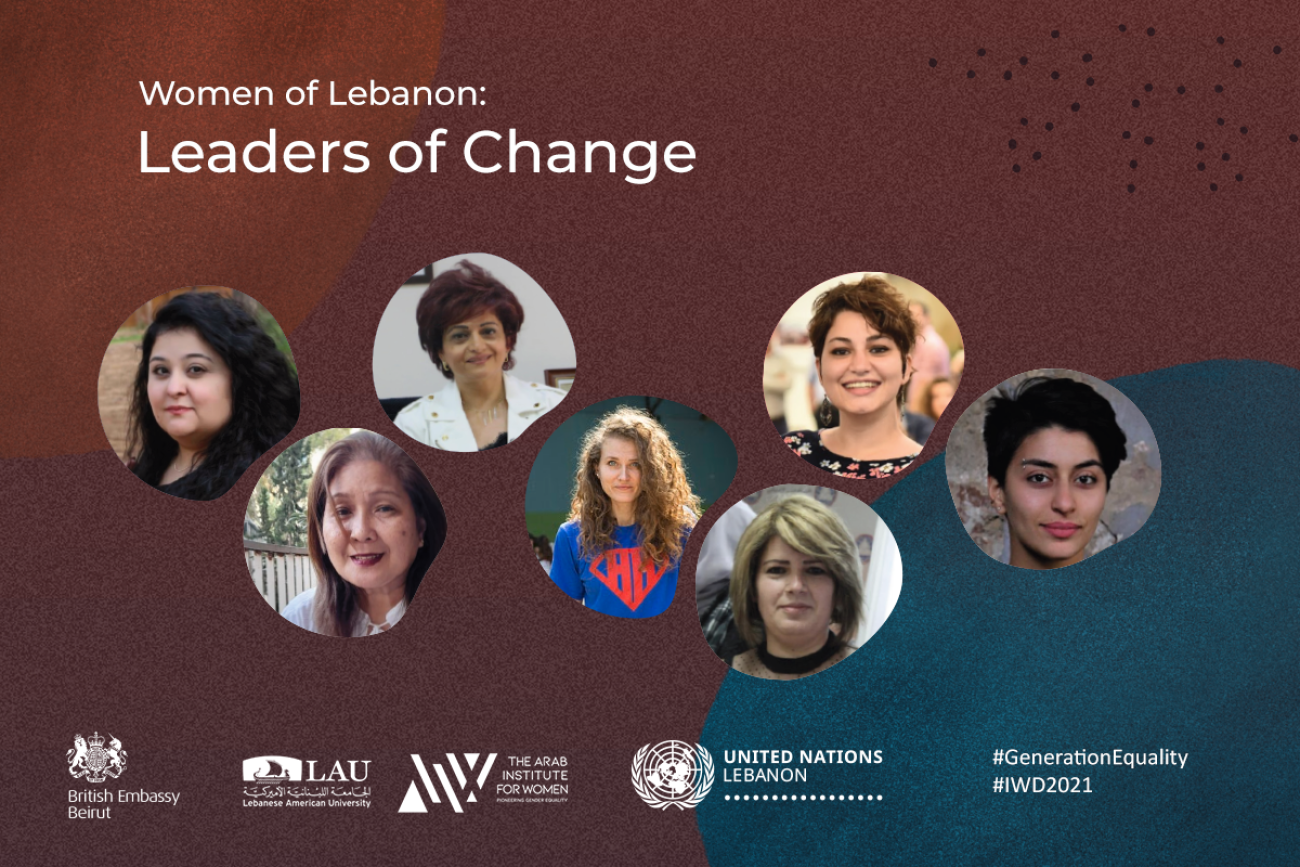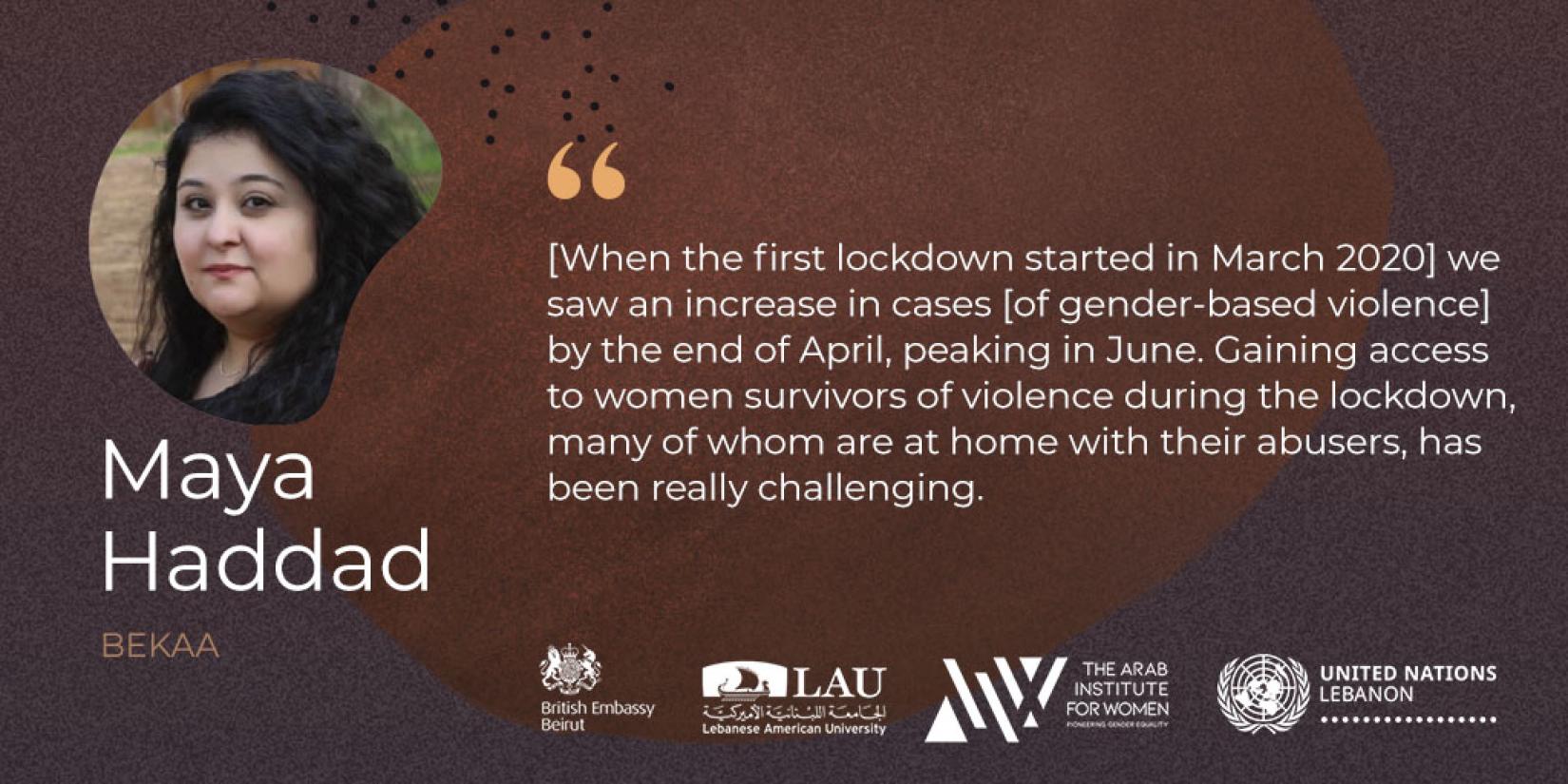Leaders of Change – Maya Haddad

Maya Haddad, 37, is a social worker and senior case manager with KAFA, focusing on women’s access to social justice and legal aid in the Bekaa region.

Since the COVID-19 pandemic began, Maya Haddad has had her work cut out for her. As a senior case worker who manages the holistic support of survivors of violence, Maya has been navigating unique challenges to her work in the context of ensuing lockdowns.
“Due to the total lockdown, we are dealing with all the cases remotely,” she shares. “This is new territory for us; gaining access to survivors is really hard as the abusers are present at home with them. If the survivor and her abuser share a phone, we have to schedule a certain time to contact her.” She explains that finding suitable shelters to take women who need such support has been an additional challenge, with strict requirements by shelters for PCR tests and quarantines.
Maya recalls one such case, “I was following up on a case of a woman who was sexually and physically abused by her father. During the lockdown, she had no option but to live with her perpetrator. Even though he stopped the sexual abuse during the confinement, he became more aggressive due to sexual repression. Luckily, the woman was able to escape and she now works and lives independently.”
Additional challenges have included the closure of courts—putting many women waiting for judgements regarding custody of their children in a bind—and the overall economic crisis which affected women’s choices. “Some women who wish to be strong and independent are simply not finding jobs,” she says, impacting the ability of women who need to escape abusive situations.
Since the outbreak of COVID-19 in early 2020, cases of gender-based violence and domestic violence have intensified drastically in Lebanon. Internal Security Forces (ISF) report the doubling of domestic violence reports in 2020, against the backdrop of what the UN describes as a “shadow pandemic” of an overall global increase in domestic abuse during coronavirus lockdowns, taking place alongside the COVID-19 pandemic.
Maya confirms this, noting that the number of calls KAFA has received during the pandemic from women seeking support reached its peak in June 2020. She emphasizes that one-third of the calls received were to do with emotional abuse. “In my field, every case leaves a certain mark. Although we tend to focus on cases of physical abuse, because these leave scars and bruises, we cannot say that these cases are the most dangerous ones. Emotional abuse has many different impacts on the psychological state of the woman. This abuse can lead to depression, PTSD and anxiety which can lower her self-esteem.”
And it is not just the abused who suffer. Trauma is not only experienced directly through first-hand violence but also through witnessing or learning of it—causing lasting psychological effects, similar to those abused. A recent UN Women report found that during the early lockdown in Lebanon, 13% more women than men surveyed reported witnessing violence against another woman, while women who had ever been married reported the highest rates of witnessing violence. Maya explains, “Gender-based violence doesn’t affect individuals only, it affects all of the society and future generations. When a child witnesses a lot of violence towards their mother, this can stay in the mind of the child forever. It’s important to raise awareness so that such patterns don’t continue through generations.”
Awareness-raising within communities is a big component of Maya’s work. “In our society, not all women have the right understanding of violence, so they assume, incorrectly, that some words or even acts are normal.” A lot of her work centers around changing social norms and reversing what she describes as a “patriarchal mentality” in society. “Every woman should know that she is more than enough, she cannot be controlled by anyone, no one has the right to take her freedom, and no one has the right to abuse her in any way.”
Success for Maya and real impact lies in those moments when she knows she’s gotten these messages across to the women she works with. “When you see that your idea was well delivered to these women, you feel self-satisfied with what you did. All our success stories—a woman who was able to get custody of her child, who got her rights, who found protection from violence—these moments keep me going in my work.”
Although Maya acknowledges that the lockdown has increased frequency and intensity of gender-based violence in Lebanon, she points out that this scourge existed long before the pandemic started. “Vulnerable groups were not born vulnerable; they are made vulnerable because of patriarchal mentality in our society and laws that don’t protect women. The major cause of gender-based violence is not the lockdown — it’s gender inequality.”
Maya Haddad, 37, is a social worker and senior case manager with KAFA, focusing on women’s access to social justice and legal aid in the Bekaa region. She supervises all cases and refers them to a multidisciplinary team which includes lawyers, psychotherapists, and case managers. KAFA aims to eliminate all forms of gender-based violence and offers social, psychological, and legal support to survivors.

